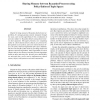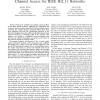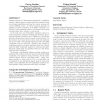16 search results - page 1 / 4 » Sharing Random Bits with No Process Coordination |
IPPS
1998
IEEE
13 years 9 months ago
1998
IEEE
We present a method by which any polynomial-time randomized distributed algorithm is transformed in such way that each participating process needs only polylog local random bits a...
ICDCS
2006
IEEE
13 years 11 months ago
2006
IEEE
Despite the large amount of Byzantine fault-tolerant algorithms for message-passing systems designed through the years, only recently algorithms for the coordination of processes ...
ICNS
2009
IEEE
13 years 11 months ago
2009
IEEE
Hashing technique have been widely adopted for various computer network applications such as IP address lookup and intrusion detection, among which XOR-hashing is one of most popu...
WCNC
2010
IEEE
13 years 8 months ago
2010
IEEE
—This paper considers the medium access problem in the IEEE 802.11 standard. Although the transmission bit rates have clearly increased, some MAC related problems remain unsolved...
PODC
2010
ACM
13 years 8 months ago
2010
ACM
Mutual exclusion is a fundamental distributed coordination problem. Shared-memory mutual exclusion research focuses on local-spin algorithms and uses the remote memory references ...



